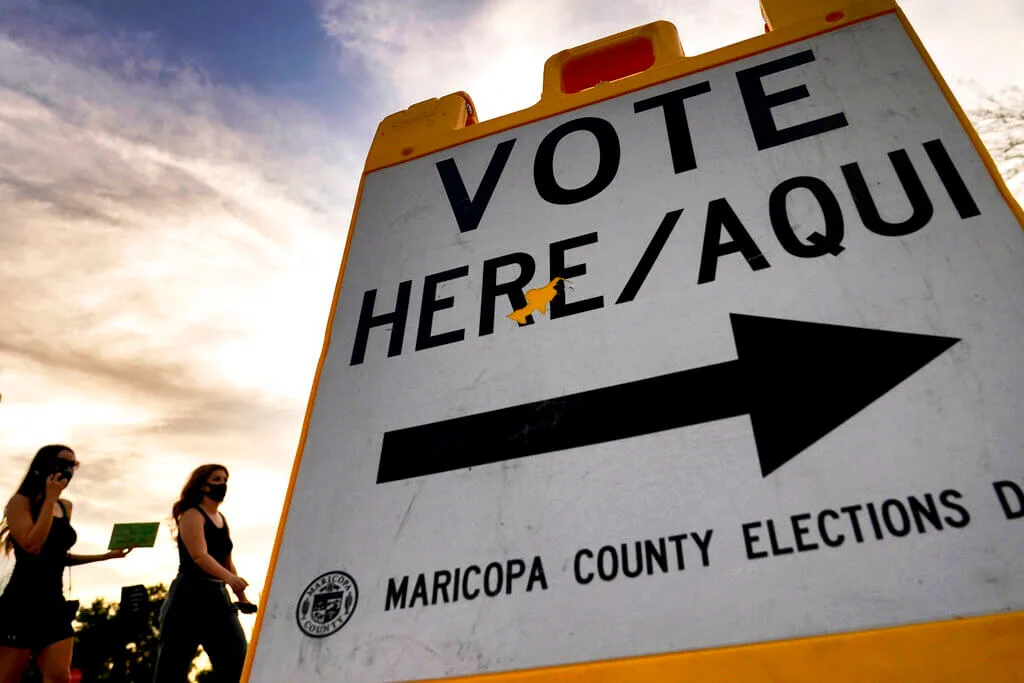
FILE - In this Nov. 3, 2020, file photo voters deliver their ballot to a polling station in Tempe, Ariz. An Associated Press investigation has found county election officials throughout Arizona have identified fewer than 200 cases of potential voter fraud from last year's presidential election that require review by local prosecutors. The findings undermine claims by former President Donald Trump and his allies that widespread fraud is to blame for his loss in Arizona. (AP Photo/Matt York, File)
Politics have a reputation for ignoring the needs of the many and prioritizing the wants of the few. According to the Pew Research Center, just under a quarter of Americans believe they can trust the government to do the right thing, a sentiment that has been felt for nearly two decades.
The Citizens Clean Elections Commission, formed in 1998, was created to change that perception by opening political races up to candidates who would normally be unable to raise the funds necessary for a campaign.
The CCEC does so by providing funding to candidates who decide to “run clean,” meaning they will not accept donations from PACs and special interest groups.
Public Funds for Public Office
In order to access the CCEC money, candidates need to raise a certain amount of $5 donations from registered voters in what would become their constituency, whether that be a legislative district, or voters throughout the entire state. The larger the office, the more donations necessary.
Those running for the State Legislature require the lowest amount of small donations, 200, while the governorship requires 4,000.
Once a candidate collects the needed number of contributions, they then can receive funding from the state’s clean election fund. Prior to dipping into the pot, candidates can fundraise a certain amount to get started, from $4,323 in the Legislature up to $63,450 for the governor’s race.
Candidates then have their primary and general — if they make it — campaigns fully funded with a certain amount of spending caps for each race. After winning or losing, any amount of money not spent must be returned to the CCEC.
Running ‘Clean’
There have been a number of “clean” candidates in recent election cycles, most prominently in Legislative District 26, which includes parts of Mesa, Tempe, Phoenix, and the Salt River Pima-Maricopa Indian Community.
In 2020, three Democratic candidates in LD26 ran “clean” campaigns and won their elections: incumbents Sen. Juan Mendez and Rep. Athena Salman, and political newcomer Rep. Melody Hernandez.
Salman said she decided to run as a clean candidate because it helps restore confidence in elected officials and who they represent.
“It’s a progressive way to run for office, to not have to run and rely on the influence of the wealthy and the powerful,” Salman said.
Voters in LD26 have a particular affinity for clean candidates, according to Salman, and “when they find out there’s a Democrat on the ballot who’s running dirty will refuse to support that person.”
There was one traditionally-funded candidate running against Salman and Hernandez in the Democratic primaries—Debbie Nez-Manuel.
According to campaign finance reports, Nez-Manuel raised about $50,000 for her campaign through traditional means. Salman and Hernandez, meanwhile, received roughly the same amount in public funds from the CCEC.
The Difference With Traditional Funding
The difference between traditional fundraising and clean campaigning is where the money comes from, whether from wealthy donors or political action committees.
For her primary, Rep. Salman raised $50,654. $45,303 of that was from the CCEC, $4,530 from individual donations and the rest from previous leftover funds, according to campaign finance reports.
Comparatively, Nez-Manuel’s $53,935 mainly came from individual donations as well as PAC’s, such as the Salt River Project, an Arizona firefighter’s union and the Laborers’ International Union of North America.
Nez-Manuel declined to comment on her campaign for this story.
Salman said she sees the clean election process as a chance to make the government more accountable to the people and bridge the gap between voters and their officials.
“There is a discrepancy between what the vast majority of the American people want to see from their public servants and a differential between what their politicians are actually pursuing and enacting as the supposedly public agenda,” Salman said.
Making ‘Clean’ Mainstream
Outside of LD26, there have been a number of other high-profile clean candidates who ran successful campaigns and were elected to office. These include State Superintendent Kathy Hoffman, and Corporation Commission members Sandra Kennedy and Anna Tovar.
Salman pointed to these three officials as examples of the clean elections process allowing more women and women of color into the political system.
“It definitely is a program in which candidates who otherwise would have an even more uphill battle in raising the funds necessary to run for office, especially statewide office,” Salman said.

He said what? 10 things to know about RFK Jr.
The Kennedy family has long been considered “Democratic royalty.” But Robert F. Kennedy, Jr.—son of Robert F. Kennedy, who was assassinated while...

Here’s everything you need to know about this month’s Mercury retrograde
Does everything in your life feel a little more chaotic than usual? Or do you feel like misunderstandings are cropping up more frequently than they...

Arizona expects to be back at the center of election attacks. Its officials are going on offense
Republican Richer and Democrat Fontes are taking more aggressive steps than ever to rebuild trust with voters, knock down disinformation, and...

George Santos’ former treasurer running attack ads in Arizona with Dem-sounding PAC name
An unregistered, Republican-run political action committee from Texas with a deceptively Democratic name and ties to disgraced US Rep. George Santos...




